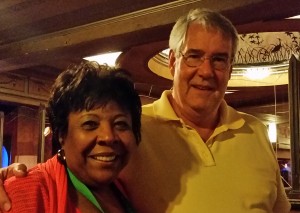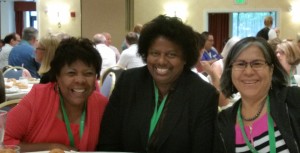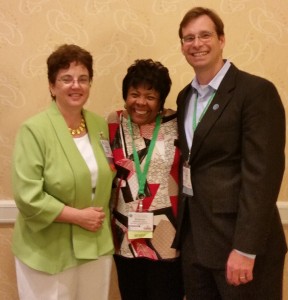This July, I attended the 30th National Conference on Problem Gambling in Tarrytown, New York. The title of the annual conference this year was “30 Years: Proud of Our Past, Planning Our Future.” New York was selected because 30 years ago this was the site for the National Council on Problem Gambling’s first conference.
Over 500 participants participated, including researchers, educators, therapists, gamblers, and family members. There were participants from all over the world including the Netherlands, Australia, Taiwan, and the U.K. The two days were filled with lectures, workshops, and Professional Educational Development (PED) talks. Within the conference structure, tracks were available for therapy, prevention, and research as well as for those in recovery.
I enjoyed the meals (they were even able to accommodate my gluten free needs) and the snacks during breaks. All events were held at the Westchester Marriott, which is located in the Lower Hudson Valley right off the Hudson River.
All the presentations I attended were stellar, but I had a few favorites:
- “Developments in Treatment” by Mark Potenza, M.D., Yale University psychiatrist and researcher, whose focus was on the challenges of getting people with gambling problems into treatment and “identifying which treatments might work best for whom.”
- Gender Differences in Treatment-Seeking British Pathological Gamblers by Henrietta Bowden-Jones, M.D., who developed the first national problem gambling clinic in the U.K.
- Richard Rosenthal, M.D., founder of the gambling treatment program in UCLA, who presented a talk on how problem gambling became accepted as a disease in the medical world back in 1980. His topic, “The Inclusion of Problem Gambling in the DSM-III” (the Diagnostic and Statistical Manual), was based on papers from the archives of the American Psychiatric Association and NCPG as well as his own documents and interviews with several members of the committee, in addition to his experience as a member of the DSM-IV IDNEC committee.
- Longtime NCPG member and former board member Don Feeney of the Minnesota Lottery presented a fantastic PED talk, “Generations in Gambling.” His focus was on whether treatment developed for Baby Boomers is appropriate for Millennials, those born 1982 to 2004. Although the talk was brief, we were left with questions about accommodating the differences between the generations: what are the differences in their ideas and beliefs about gambling and in their gambling behavior? For instance, the Millennials grew up in an era of acceptance for gambling after lotteries opened the door; Baby Boomers had to be sold on it, literally.
- Roberta Broughton from Ontario presented a workshop with focus on women and group work, two topics that are of particular interest to me. Her topic was titled “Treatment of Female Gamblers: A Workbook and Webinar Effectiveness Pilot.” Roberta has designed a five-unit workbook focusing on issues presented by women gamblers. The workbook is designed to increase resilience and teach skills necessary for sustained recovery.
- Dr. Heather Chapman, director of the Louis Stokes Hospital Gamblers Recovery Program (Brecksville, Ohio), discussed client reluctance and GA. As an aside, Brecksville was the first hospital to treat gamblers—ever—in 1972. For those of you who have questioned GA’s effectiveness or validity, Dr. Chapman said that GA continues to be underutilized, despite suggestions by therapists and others that GA is a helpful adjunct in the recovery process. I believe that a 12-step program is essential. Treatment is short-term, but the disease is always going to be there, and one needs as much ammunition as possible to keep the disease at bay. Where else in society besides GA can one get ongoing reinforcement and understanding about a disease that is “cunning, baffling and powerful”?
Why Attend a Gambling Conference
All of these topics allow me to be more sensitive to my clients’ needs. The field is changing as gambling has become more prevalent and the means of gambling more sophisticated. We as therapists must continue to avail ourselves of opportunities that enhance our knowledge and allow us to share ideas so that we can best support those whose gambling has gone way beyond a social level in addition to those affected by their gambling.
I’m already looking forward to the 31st National Conference on Problem Gambling in Portland, Oregon, where the topic will be Listening, Learning, Leading, all of which I hope to do next July. Until then, I will implement new information in individual and group sessions.



